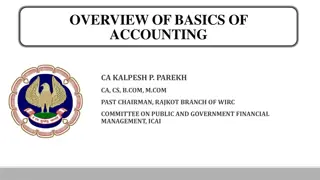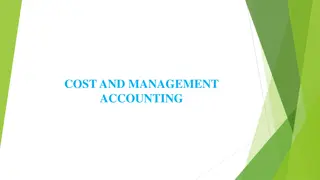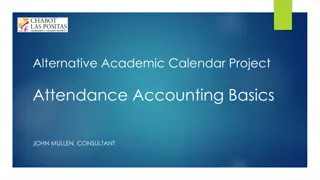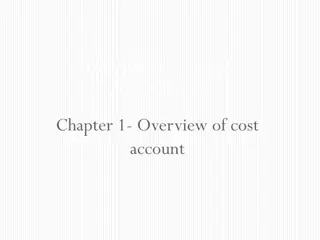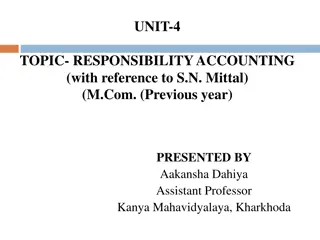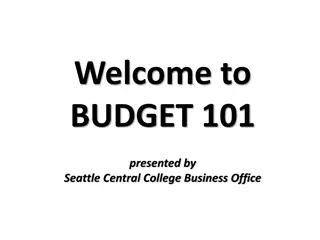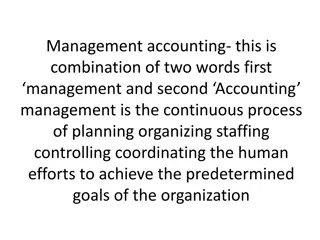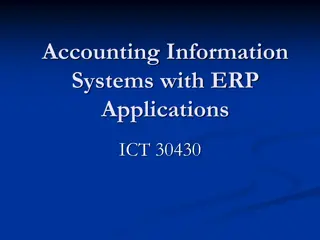Understanding Responsibility Accounting in Organizations
Responsibility accounting is a cost accounting system that focuses on accountability and performance evaluation at various managerial levels within an organization. It assigns specific revenues and costs to individuals with pertinent responsibilities, aiding in decision-making and performance reporting. Developed to reflect plans and actions of different centers or departments, this approach enables managers to take authority and be accountable for activities within their designated areas.
- Responsibility Accounting
- Cost Accounting
- Performance Evaluation
- Managerial Accountability
- Decision Making
Download Presentation

Please find below an Image/Link to download the presentation.
The content on the website is provided AS IS for your information and personal use only. It may not be sold, licensed, or shared on other websites without obtaining consent from the author. Download presentation by click this link. If you encounter any issues during the download, it is possible that the publisher has removed the file from their server.
E N D
Presentation Transcript
By Dr.J.SUNDARARAJ Associate Professor Department of Commerce Annamali University
Content Concept of responsibility accounting, Steps in Establishing/Designing Responsibility Accounting System Benefits/Advantages/Merits/Uses of responsibility accounting Limitations of Responsibility Accounting Essentials of Success Of Responsibility Accounting
The Concept of Responsibility Accounting The framework of responsibility accounting was developed by Professor A.J.E. Sorgdrager titled Particularisationof Indirect Costs . Responsibility accounting is a cost accounting system established on a responsibility basis Responsibility accounting is a method of budgeting and performance reporting structureof the organization. Responsibility accounting is a method of budgeting and performance reporting structureof the organization. created around the created around the
Defintion: Responsibility accounting is a system of accounting that recognizes various throughout the organization and reflects the plans and actions of each of these centres by assigning particular revenues and cost to the one having the pertinent responsibility. It is also called profitability accounting and activityaccounting. responsibility centres -Charles T Horngren
Responsibility management accounting that collects and reports both planned and actual accounting information in terms of responsibilitycentre . - Robert N Antony A method of accounting in which costs are identified with persons assigned to their control rather than with producersor functions . accounting as that type of -Eric I Kohler
Meaning In simple words, it could be described as a system of collecting and reporting accounting data on the basis of managerial level. Responsibility accounting is the approach to accountability- identification of cost, with the persons responsible Performance is evaluated responsibilities. Reporting on performance is on the lines of organizational structure. There is a separate report for each box of the organization chart. for their incurrence. assigned by
Responsibility accounting is an arrangement under which managers are given decision making authority and are made responsible for their area of assigned activity occurring within a specific department/divisionof thecompany
4.2 Steps in Establishing/Designing Responsibility Accounting System 1. Establishing Responsibility Centers 2. Limits to Controllable Costs 3. Flexible Budgeting 4. Performance Reporting
Merits/Advantages/ Uses/Benefits of Responsibility Accounting Performance Evaluation 1. 2. Delegating Authority 3. Motivation 4. Corrective Action 5. Management by Objectives 6. Management by Exception 7. High Morale and Efficiency
Limitations of Responsibility Accounting Failure of support of top management Unorganized structure of the organization Unrealistic goals Defective reporting system Impact of behavioural system
Reference Famning, David. Responsibility Accounting in Handbook of Management Accounting . England : Gower Publishing Co., 1983. Horngren, Charles T., Srikant M. Dater, George Foster, Madhav Rajan, and Christopher Ittner. Cost Accounting: A Managerial Emphasis. 13. New York : Pearson, 2015. Lal Nigam B.M., and G.L.Sharma . Practical Costing. Mumbai : Himalaya Publishing House, 2006. Saxena , and Vashist. Cost and Management Accounting . New Delhi : Suiltan Chand and Sons , 2008.






